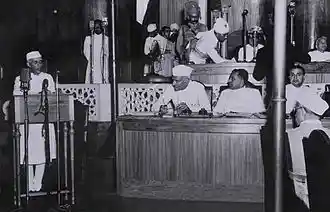A Home for You and Me
“It is fitting that at this solemn moment, we take the pledge of dedication to the service of India and her people and to the still larger cause of humanity.”

Glimpses of the first official celebration of Indian independence; Source- Wikimedia Commons
When you dream of something, you put in all your efforts to make it happen. You want to experience your dream as a reality and not just some figment of imagination.
But what if you know that you would never be able to live this dream, no matter what price you pay for it or the sacrifices you make, it would remain a distant vision. This was the reality of the countless and often nameless people who laid down their everything for a dream called India- a sovereign nation whose citizens would breathe in the air of freedom and keep their heads high.
It didn’t matter to them whether they would be a part of this country or not, the assurance that someday, the sun would usher in a new dawn and the tyranny of the British colonial empire would end, was a reason enough for them to keep on fighting.
Blood, sweat and tears coiled with hope made Indian independence possible. To live as free citizens on our own, numerous people happily sacrificed their lives. On the foundations of anti-colonialism and self-determination, the Republic of India was born.
The fight for sovereignty was not an easy one. Right from the tribal resistance of the Birsa Munda, to the open challenge of Begum Hazrat Mahal, from Gandhi’s satyagraha to Bhagat Singh’s Inqilab, the British were confronted in multiple ways. It was a long night of darkness and the morning only came in the 1950s.
It was a mixture of internal and external pressures that eventually made the British exit India. They did not leave quietly through the backdoor; they were ousted.
World War II on one hand had emptied the empire’s coffers and on the other, a new vision for human rights and humanity was being constructed- colonialism had no place in it.
It did not take the Labor government in London that occupation of India would only get difficult with each passing day. The nationalist movement in the country was at a roaring ebb and the Congress’ demand for representation had tipped into securing complete self-governance. There was no scope for concessions and Indians were ready to fight tooth and nail.
Prime Minister Clement Attlee was left with no option and he declared that the controlling strings of the British would finally be cut. A new Viceroy, Mountbatten was imminently sent to India to look after the process of power transfer. He decided the second anniversary of Japan’s surrender in the great war would be the perfect date for this historic event. By now, multiple efforts for the reconciliation between the Indian National Congress and the Muslim League, right from the Cripps mission to Mounbatten’s brainchild- the Dickie Bird Plan had failed. It was clear that with the retreat of the British, two new nations, India and Pakistan would find a place on the world map.
On 11 pm 14 August, the Constitutional Assembly of India met for the fifth time. While each of their meetings was historic, this one, in particular, was a momentous marker, for it was here that the Indian Independence was announced.
With Nehru’s iconic speech, as the clock struck 12, India was a free nation. While India’s republic status was still under construction and Lord Mountbatten was the country’s first Governor-General, it was finally a country that truly belonged to each other.
This was a new beginning and a blank slate lay ahead of us. It was important to ensure that India moves forward on the road to justice and democracy.
The air of celebration was also marred by the stench of blood for this freedom came with a heavy price- the partition. This huge movement of humans from a porous border was accompanied by communal violence. Shuddering accounts of grotesque and inhumane actions came from both East and West.
Needless to say, not all was perfect then and not all is perfect today. This nation was released on the ideals of deep introspection and self-criticism. Remembering the struggles that got us here today is important but so is critically thinking about the way forward.
India is a work in progress and it’s up to us to construct in a way that gives justice to the sacrifice of the people to whom we owe our freedom.


